Principal Investigator

Meaghan Creed, PhD
Principal Investigator, Associate Professor
Meaghan Creed earned her PhD in neuroscience and pharmacology from the University of Toronto, before completing post-doctoral training at the University of Geneva. Prior to beginning her PhD, Dr. Creed worked as a technician at Inter Vivo Therapeutics, a contract research organization in Toronto, testing the efficacy of lead compounds on behavioral outcomes in models of movement disorders. Motivated to understand and optimize brain therapies, she began her PhD at the Center for Addiction and Mental Health, under the supervision of Dr. José Nobrega. Here, she studied the mechanisms underlying the adverse side effects of deep brain stimulation for movement disorders, and suggested targeting the serotonin system could reduce these symptoms. She continued this focus on deep brain stimulation and brain plasticity during her post-doc with Dr. Christian Lüscher, where she focused on how addictive drugs induce plasticity in the basal ganglia, and how deep brain stimulation can be used to restore circuit function and reduce symptoms of addiction.
Since beginning her lab at the Washington University Pain Center in 2018, her research team has focused on understanding function of the basal ganglia. The lab uses electrophysiology, single nucleus RNA sequencing and behavioral phenotyping in mice and humans to understand how chronic pain and opioid medications change function of basal ganglia circuits, and how these circuit changes drive cognitive-affective symptoms of chronic pain and opioid use disorder. With her team, we ask why some individuals who experience an injury can take pain medication as prescribed, while others transition to medication misuse? Why do some individuals who experience an injury recover, while some develop chronic pain and affective symptoms? How can deep brain stimulation be optimized to treat individuals who develop these debilitating symptoms? Our ultimate goal is to translate this understanding into new neuromodulation therapies for chronic pain and opioid use disorder. Her work is supported by the Rita Allen Foundation, Brain and Behavior Research Foundation, Whitehall Foundation and National Institutes of Health.Dr. Creed is committed to education and mentoring, serving on the Education and Professional Development committee of the United States Association for the Study of Pain, as a member of the neuroscience graduate program steering committee, and as director of a graduate level course in Pain Neurobiology. She is also an associate member of the American College of Neuropsychopharmacology and standing member of the Molecular and Cellular Neuropharmacology study section.
Lab Members

Titi Akinwe
Graduate Student
Titi is a PhD student in the Molecular Genetics and Genomics program. Before coming to WashU, Titi graduated with a BS in Neuroscience from Georgia State University. During their undergrad career, they mostly focused on computational neuroscience but became interested in genomics and its applications to Precision Medicine through a SURP at Medical University of South Carolina. This interest was further developed through the OGR program at MGI where they narrowed down their interest to the genetic etiology of neurodevelopmental and psychiatric disorders. They are co-mentored by Drs. Joe Dougherty and Meaghan Creed on a collaborative project focused on exploring the epigenetic and transcriptomic landscape of ventral pallidum cells in the context of opioid self-administration mouse models. In their free time, they love exploring the local culinary scene, trying out cocktail recipes, dreaming of becoming a DJ on the side, community organizing, and cuddling with their cat.

Mason Barrett
Research Specialist
He graduated from the University of Kansas with a B.S. in Behavioral Neuroscience in 2023 and joined the Kravitz lab to gain research experience. He is interested in decision-making and feeding behaviors in mice.

Gargi Chatterjee Basu, PhD
Staff Scientist
Gargi did her Ph.D in Biochemistry from India and joined Washington University in St Louis to pursue her postdoctoral research. During postdoc, her research focused on studying the role of obesity in behavior and neurogenesis. After finishing her postdoc in February 2024 she joined Kravitz lab as a Staff Scientist. She will carry on her research on obesity and neuroinflammation and spend time managing the lab. During her spare time, she loves spending time with her family and puppy Stella.

Lisa Fang, PhD
Postdoc
Hailing from the east coast of Canada, Lisa received her PhD from Memorial University in Newfoundland where she studied the effect of diet-induced inflammation on hypothalamic cell activity. She joined the Creed lab as a postdoc in November 2023 and is leveraging her expertise in patch clamp electrophysiology, combined with transcriptomics, to investigate how distinct ventral pallidal circuits and cell types become altered during disease states. In her spare time, Lisa enjoys binge-watching tv shows (and is always accepting new recommendations!), reading, and sharing a coffee with friends.

Jeff Goff
Research Technician
Jeff graduated from the University of Kansas with a BS in biology in 2023. He then did a yearlong fellowship at the National Institutes of Health before joining the Creed lab in 2024. He is interested in research related to the effects of stress on motivation and decision-making.

Robert Graham, PhD
Postdoc
Dr. Robert (Bobby) Graham is a postdoctoral fellow from Chestertown, Maryland. He obtained his BS in Bioengineering from George Mason University and his MSE and PhD in Biomedical Engineering under the supervision of Dr. Scott Lempka at the University of Michigan. His doctoral work applied computational methods to study the mechanisms of action of neurostimulation therapies for chronic pain such as dorsal root ganglion stimulation and spinal cord stimulation, and how inherent biological variability can affect the neural response to these therapies. In the Creed lab, Bobby’s work combines electrophysiology, optogenetics, in vivo imaging, and behavioral methods to study the circuit and synaptic mechanisms of action of deep brain stimulation. The ultimate goal of this work is to provide a mechanistic rationale for the continued innovation of electrical stimulation therapies which treat neurological disorders. When not in the lab, Bobby is likely playing music or finding concerts, coffee shops, and pool tables around St. Louis.

Lex Kravitz, PhD
Scientific Collaborator
Dr. Lex Kravitz is an Associate Professor of Psychiatry and Neuroscience at Washington University. His lab focuses on understanding basal ganglia function in health and disease, with a focus on the neural substrates of co-morbid eating and psychiatric disorders. He is also an active advocate for open source neuroscience.
He is a frequent collaborator with the Creed Lab, sharing some common lab space, technicians and lab manager.

Michelle Lynch
Research Specialist
Michelle graduated from Southern Illinois University Edwardsville with a B.S. in Biology in 2023. She joined the Creed lab in July 2023 as a member of the Neuroprep postbaccalaureate program. She is interested in studying the role of individual cell types in motivation and decision-making, particularly in the context of psychiatric disorders. In her spare time, Michelle enjoys walking in Tower Grove Park, hanging out with her cats, and baking.

Jeremy Thompson, MD / PhD
Instructor
Dr. Jeremy Thompson is from Houston, TX and obtained his MD and PhD degrees from Texas Tech University Health Sciences Center. He came to Washington University as part of the Academic Scholars Advancement Program and completed residency training in Anesthesiology and fellowship training in Pain Management. He joined the Creed Lab in October 2022 for postdoctoral training utilizing electrophysiology and behavioral assays to study chronic pain-related mesocorticolimbic dopamine neuron plasticity. He is currently an Instructor within the Division of Pain Management and Washington University Pain Center.

Jessica Tooley
Graduate Student
Jessica Tooley is from southern Wisconsin and attended St. Norbert College. She graduated with a BA in Psychology before joining the Creed Lab in June 2017 as a research technician. Jess has been performing behavioral assays with in vivo electrophysiology recordings and optogenetic manipulations.
Jess is now continuing in the lab as a neuroscience PhD student in the Washington University Division of Biology and Biomedical Sciences. She is rapidly learning patch clamp electrophysiology, and is using her skillset to determine how synaptic adaptations in the ventral pallidum mediate compulsive drug seeking in the context of addiction.

Habby Wang
Graduate Student
Hanyun (Habby) Wang grew up in southern China and earned a BA in Economics and a BS in Neuroscience from Tulane University in New Orleans, Louisiana. She continued at Tulane in the Neuroscience 4+1 Master’s program on the thesis track, where she investigated thalamocortical circuit network oscillations using computational modeling. Habby is now a graduate student in the Neuroscience Graduate Program at WashU, pursuing the Cognitive, Computational, and Systems Neuroscience (CCSN) pathway. Since joining the Creed lab in May 2024, she has been mastering various lab techniques and contributing to DBS and chronic pain-related projects. Outside the lab, Habby enjoys spending time with her cats, hiking, traveling, and exploring new restaurants and bars with friends.

Suzy Xu
Graduate Student
Chang (Suzy) Xu grew up in a small city in Zhejiang Province, China, and has since embraced a global journey in neuroscience. She earned her BSc in Life Sciences from the University of Manchester and an MSc in Neuroscience from UCL. Before starting her PhD training in the Washington University in St. Louis, she worked as a research technician at the Sainsbury Wellcome Centre in London. There, she investigated the neural mechanisms that support innate yet plastic social behaviours.Suzy is now a PhD student in the Creed lab. She is passionate about using her favourite neuroscience technique—patch-clamp electrophysiology—alongside animal behavior and modern circuit neuroscience approaches to dissect the roles of ventral pallidal circuits in substance use disorders.Outside the lab, Suzy enjoys sleeping, playing tennis and travelling.
Lab Alumni
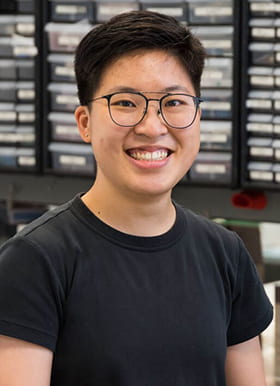
Yu-Hsuan Chang
Graduate Student (Alumni)
Yu-Hsuan (Sharon) Chang is from Taipei, Taiwan and earned her Master’s degree in systems neuroscience from National Tsing Hua University. She joined the Creed Lab in March 2020. Sharon came to the lab with a background in behavioral neuroscience and has quickly become an expert at programming and designing specialized behavioral equipment to test novel hypotheses.
Her project investigates synaptic adaptations within the mesolimbic dopamine system induced by chronic pain and the relevance of these adaptations in drug addiction.
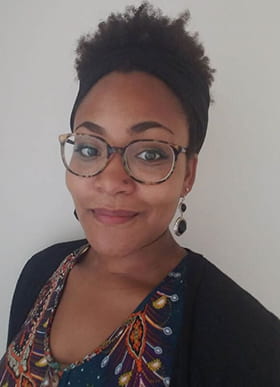
Wambura Fobbs, PhD
Postdoc (Alumni)
Dr. Wambura Fobbs grew up in Virginia, but has since lived in many states as she pursued her academic training. She obtained a BS from Yale University and a PhD from University of Washington before embarking on postdoctoral training at the National Institutes of Health, American University, and now Washington University. She has a long-standing interest in the neural and psychological basis of motivated behaviors, and she is eager to apply her background in behavioral analysis to ongoing projects in the Creed and Kravitz labs.
When not in lab, she runs after her dog, talks to her plants, works on fiber-related crafts, and learns more about new pedagogy practices and DEI initiatives.
Wambura is currently a tenure track assistant professor of neuroscience at Swarthmore College

Quinlan McGrath
Lab Technician (Alumni)
Quinlan is an undergraduate student in the biomedical engineering program at Washington University and will be joining the Creed Lab in the summer of 2021. Quinlan has experience with Fusion 360, java, and c++. And also enjoys and has experience working with 3D printers and constructing phantom physiological organ systems.
She has previously interned at a startup that focuses on targeted drug delivery and this has furthered her skills and interest in medical devices and deep brain stimulation. Quinlan will be working on optimizing wireless devices for deep brain stimulation and targeted drug delivery in animal models of co-morbid chronic pain and opioid withdrawal.

Kelsey Person
Undergraduate Scholar (Alumni)
Kelsey Person is joining the Creed Lab for the summer of 2021 through the Washington University ENDURE program (http://endure.wustl.edu/, @WUSTL_ENDURE).
Here, she will build on her existing experience studying ventral pallidal neuroanatomy to characterize functional anatomy of neurochemically-defined output pathways of the ventral pallidum (VP). She will apply viral-genetic tracing, electrophysiological and behavioral analysis to understand how discrete populations of neurons in the VP contribute to impulsive behaviors in models of substance use disorder.
Kelsey is currently a PhD student at the University of Minnesota Program in Neuroscience.
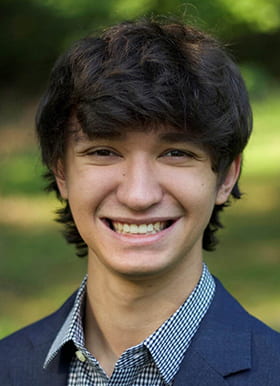
Robert Schaefer, BEng
Lab Technician (Alumni)
Robbie grew up in St. Louis, Missouri, and earned his Bachelor’s degree in electrical engineering at the University of Notre Dame with experience in biomedical device design, machine learning, and embedded systems. He joined the Creed Lab in August of 2020 as a research technician. In the lab, he has been developing a novel device to perform wireless controlled deep brain stimulation in mice in order to investigate how this stimulation can be used for pain relief in animal models.
Outside of the lab, Robbie enjoys movies, piano, and local coffee shops. Robbie plans to attend medical school after his time in the Creed Lab.
Robbie is currently in medical school at Saint Louis University
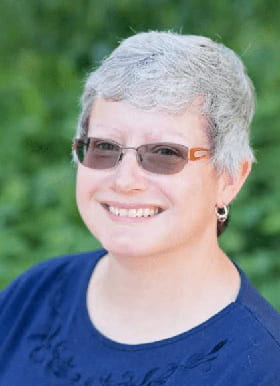
Chris Stander, MSc
Lab Manager (Alumni)
Born and raised in the Greater Cincinnati area, Chris has been in St. Louis since 2001. With a bachelor’s degree in biology from University of Dayton, and a master’s degree in zoology from Indiana University, she has chosen to focus her energies on lab management, while maintaining an interest in cell biology. Chris joined the Creed Lab in December 2018. When not tending to the needs of the lab, Chris spends time with her dogs and volunteers at a local animal shelter.
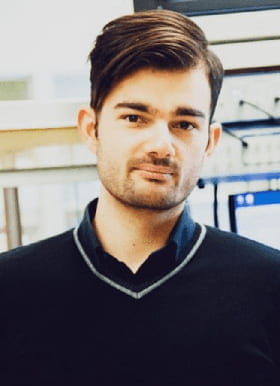
Yvan Vachez, PhD
Postdoc (Alumni)
Dr. Yvan Vachez is from Grenoble, France, where he graduated with a license in biology, and a master’s degree in Neurosciences and Neurobiology. Yvan obtained his PhD from the Grenoble Institute for Neuroscience under the supervision of Dr. Sabrina Boulet and Dr. Sebastian Carnicella in 2018. In the Creed lab, Yvan studied self-administration of addictive drugs altered plasticity at synaptic outputs of the ventral pallidum to other basal ganglia nuclei.
When he’s not in the lab, Yvan loves watching movies and playing tennis.
Yvan is currently a junior group leader at the Université Grenoble.